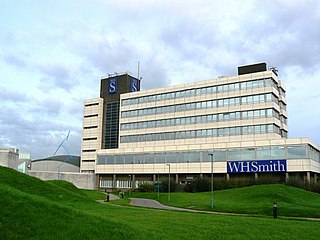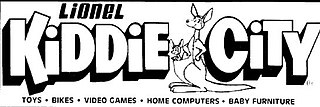
WH Smith PLC, trading as WHSmith, is a British retailer, with headquarters in Swindon, England, which operates a chain of high street, railway station, airport, port, hospital and motorway service station shops selling books, stationery, magazines, newspapers, entertainment products and confectionery.

A variety store is a retail store that sells general merchandise, such as apparel, auto parts, dry goods, toys, hardware, furniture, and a selection of groceries. It usually sells them at discounted prices, sometimes at one or several fixed price points, such as one dollar, or historically, five and ten cents. Variety stores, as a category, are different from general merchandise superstores, hypermarkets, warehouse clubs, grocery stores, or department stores.

Virgin Megastores is an international entertainment retailing chain, founded in early 1976 by Richard Branson as a record shop on London's Oxford Street.

Toys "R" Us is an American toy, clothing, and baby product retailer owned by Tru Kids and various others. The company was founded in 1948; its first store was built in April 1948, with its headquarters located in Parsippany-Troy Hills, New Jersey, in the New York metropolitan area.

Hamleys of London Limited, trading as Hamleys, is a British multinational toy retailer, owned by Reliance Retail. Listed in the Guinness Book of Records as the world's oldest toy store, it was founded by William Hamley as "Noah's Ark" in High Holborn, London, in 1760. It moved to its current site on Regent Street in London's West End in 1881. This flagship store is set over seven floors, with more than 50,000 lines of toys on sale. It receives around five million visitors each year.

Big Lots Stores, Inc. is an American discount retail chain headquartered in Columbus, Ohio. Founded in 1967 as Consolidated Stores, it has over 1,000 locations across the United States. Big Lots stores typically sell closeout and overstock merchandise from other stores, although some stores also sell furniture.

Woolworths was a British high-street retail chain. At its height, it operated as Woolworths Group PLC, which included other companies such as the entertainment distributor Entertainment UK, and book and resource distributor Bertram Books.

British Home Stores, commonly abbreviated to BHS and latterly legally styled BHS Ltd, is an online store and formerly a British department store chain, primarily selling clothing and household items. In its later years, the company began to expand into furniture, electronics, entertainment, convenience groceries and fragrance and beauty products. BHS traded from 1928 to 2016; the brand was later licenced to an online retailer.

HMV is a British music and entertainment retailer, founded in 1921. The brand is owned by JD Sports and operated by Sunrise Records, except in Japan, where it is owned and operated by Lawson.
Walden Book Company, Inc., doing business as Waldenbooks, was an American shopping mall-based bookstore chain and a subsidiary of Borders Group. The chain also ran a video game and software chain under the name Waldensoftware, as well as a children's educational toy chain under Walden Kids. In 2011, the chain was liquidated in bankruptcy.
Consumers Distributing was a catalogue store in Canada and the United States that operated from 1957 to 1996. At its peak, the company operated 243 outlets in Canada and 217 in the United States; these included stores in every province in Canada and in the states of New Hampshire, Massachusetts, Connecticut, New York, New Jersey, Pennsylvania, Maryland, California and Nevada.

Currys is a British electrical retailer and aftercare service provider operating in the United Kingdom and Ireland, specialising in white goods, consumer electronics, computers and mobile phones.
Habitat is a brand of household furnishings in the United Kingdom and the main homewares brand within the Sainsbury's group.
Service Merchandise was a retail chain of catalog showrooms carrying jewelry, toys, sporting goods and electronics. The company, which first began in 1934 as a five-and-dime store, was in existence for 68 years before ceasing operations in 2002.
Farmers Trading Company Ltd is a New Zealand mid-market department store chain. Headquartered in Flat Bush, Auckland, Farmers operates 59 stores across New Zealand, specialising in family fashion, beauty, homewares, furniture, large appliances and whiteware.

Poundland Limited is a British variety store chain founded in 1990. It once sold most items at the single price of £1, including clearance items and proprietary brands. The first pilot store opened in December 1990 following numerous rejections by landlords who had reservations about allowing a single-price store to operate, fearing it could adversely affect the local competition. An estimated 7 million customers shopped in Poundland every week in 2016, many being female shoppers in the C1, C2, D and E categories. Following a drop in share price of over 50%, Poundland was acquired in August 2016 by Steinhoff International for £610 million.

The Lionel toy stores were American toy store chains under the ownership of Lionel Corp.

99p Stores Ltd. was a family-run business founded in January 2001 by entrepreneur Nadir Lalani, who opened the first store in the chain in Holloway, London, with a further three stores opening later that year. In 2002, Lalani decided to expand the business throughout the UK and had rapidly developed 99p Stores, operating a total of 129 stores as of March 2010 and serving around 1.5 million customers each week, undercutting their main rival Poundland by a penny. As of mid-2009 the company offered more than 3,500 different product lines throughout its stores.

Modelzone is a scale model brand, owned by British retailer WHSmith, of which scale models and related products are sold in WHSmith stores and online.













